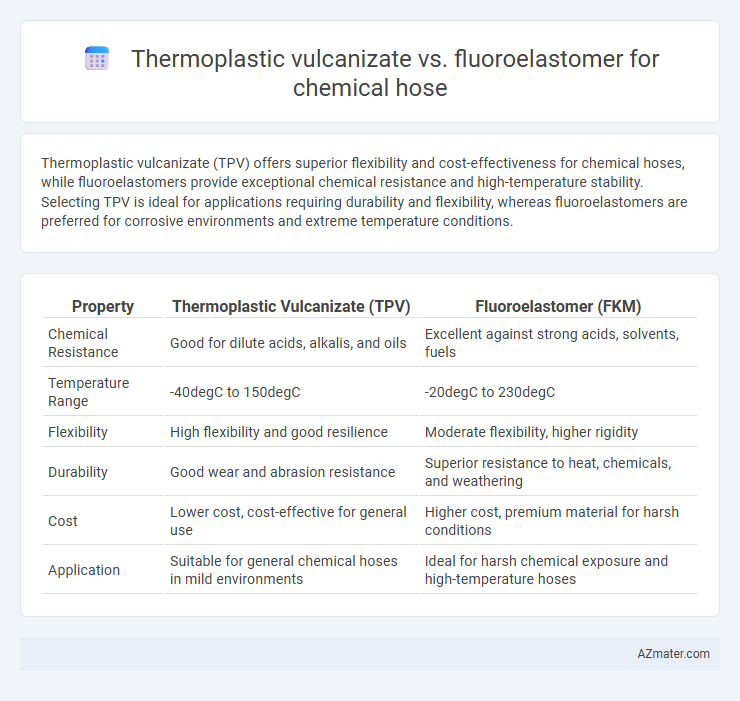Thermoplastic vulcanizate (TPV) offers superior flexibility and cost-effectiveness for chemical hoses, while fluoroelastomers provide exceptional chemical resistance and high-temperature stability. Selecting TPV is ideal for applications requiring durability and flexibility, whereas fluoroelastomers are preferred for corrosive environments and extreme temperature conditions.
Table of Comparison
| Property | Thermoplastic Vulcanizate (TPV) | Fluoroelastomer (FKM) |
|---|---|---|
| Chemical Resistance | Good for dilute acids, alkalis, and oils | Excellent against strong acids, solvents, fuels |
| Temperature Range | -40degC to 150degC | -20degC to 230degC |
| Flexibility | High flexibility and good resilience | Moderate flexibility, higher rigidity |
| Durability | Good wear and abrasion resistance | Superior resistance to heat, chemicals, and weathering |
| Cost | Lower cost, cost-effective for general use | Higher cost, premium material for harsh conditions |
| Application | Suitable for general chemical hoses in mild environments | Ideal for harsh chemical exposure and high-temperature hoses |
Introduction to Chemical Hose Materials
Thermoplastic vulcanizate (TPV) and fluoroelastomer represent two advanced materials widely used in chemical hose manufacturing for their distinct chemical resistance and durability properties. TPVs offer excellent flexibility, good resistance to acids, alkalis, and oils, and are suitable for moderate temperatures, making them cost-effective for many industrial applications. Fluoroelastomers provide superior chemical inertness, outstanding resistance to high temperatures, aggressive solvents, and fuels, ideal for harsh chemical environments requiring maximum performance and longevity.
Overview of Thermoplastic Vulcanizate (TPV)
Thermoplastic Vulcanizate (TPV) is a versatile material known for its excellent chemical resistance, flexibility, and durability in chemical hose applications. TPV combines the processing advantages of thermoplastics with the elastic properties of vulcanized rubber, offering superior resistance to oils, solvents, and acids commonly encountered in industrial environments. This unique blend enables TPV hoses to withstand high pressure and temperature variations while maintaining structural integrity and long service life.
Understanding Fluoroelastomer (FKM)
Fluoroelastomer (FKM) offers exceptional chemical resistance and high-temperature stability, making it ideal for chemical hoses exposed to aggressive fluids and harsh environments. Thermoplastic vulcanizate (TPV) provides flexibility and ease of processing but lacks the superior chemical resistance and thermal performance of FKM. FKM's molecular structure enables it to withstand oils, fuels, and solvents, ensuring longer hose lifespan and reliability in demanding applications.
Chemical Resistance Comparison: TPV vs Fluoroelastomer
Thermoplastic vulcanizate (TPV) offers moderate chemical resistance suitable for non-aggressive fluids, making it ideal for general-purpose chemical hoses. Fluoroelastomers excel in chemical resistance, providing superior durability against aggressive chemicals, solvents, and high-temperature environments commonly encountered in industrial applications. When selecting hoses for corrosive or harsh chemical transfer, fluoroelastomer materials ensure enhanced longevity and reliability over TPV alternatives.
Temperature Tolerance in Chemical Hose Applications
Thermoplastic vulcanizates (TPVs) typically offer temperature tolerance up to 135degC, making them suitable for moderate heat chemical hose applications, whereas fluoroelastomers excel with resistance to temperatures as high as 200degC or more, ideal for harsh, high-temperature environments. In chemical hose applications requiring long-term exposure to aggressive chemicals at elevated temperatures, fluoroelastomers outperform TPVs due to superior thermal stability and chemical resistance. Selecting fluoroelastomer hoses ensures durability and safety in processes involving hot acids, solvents, and fuels, while TPVs serve cost-effective use in less demanding temperature conditions.
Flexibility and Durability Performance
Thermoplastic vulcanizate (TPV) offers excellent flexibility with superior elasticity and quick recovery, making it ideal for dynamic chemical hose applications requiring frequent bending. Fluoroelastomer (FKM) provides unmatched chemical resistance and high durability against aggressive chemicals, elevated temperatures, and ozone exposure, ensuring long-term performance in harsh environments. While TPV excels in flexibility and abrasion resistance, FKM outperforms in chemical resistance and thermal stability, creating a balance between flexibility and durability depending on specific hose requirements.
Cost Analysis: TPV vs Fluoroelastomer
Thermoplastic vulcanizate (TPV) offers a cost-effective solution for chemical hoses due to its lower raw material and processing expenses compared to fluoroelastomers, which are typically priced higher because of their superior chemical resistance and temperature tolerance. TPV's ease of manufacturing and recyclability contribute to reduced overall production costs, making it suitable for applications with moderate chemical exposure. Fluoroelastomer hoses, while more expensive upfront, deliver extended service life and reduced downtime in highly aggressive chemical environments, possibly offsetting higher initial costs with long-term savings.
Installation and Maintenance Considerations
Thermoplastic vulcanizate (TPV) offers easier installation due to its flexibility and lighter weight compared to fluoroelastomer (FKM), which is more rigid but provides superior chemical resistance, especially against aggressive fluids like acids and solvents. Maintenance of TPV hoses is often simpler, with fewer specialized tools required for repairs, whereas FKM hoses need careful handling to avoid damage from chemical exposure and maintain their sealing performance. Selecting TPV or FKM for chemical hose applications depends on the installation environment and frequency of maintenance, balancing ease of use with long-term durability and chemical compatibility.
Environmental Impact and Sustainability
Thermoplastic vulcanizates (TPVs) offer superior recyclability and lower environmental impact compared to fluoroelastomers (FKMs), as TPVs can be reprocessed multiple times, reducing waste and energy consumption. Fluoroelastomers, while highly resistant to chemicals and extreme conditions, often involve more complex manufacturing processes and limited recyclability, contributing to higher carbon footprints. Selecting TPV-based chemical hoses supports sustainable practices through reduced greenhouse gas emissions and enhanced material circularity in industrial applications.
Choosing the Optimal Material for Chemical Hose Applications
Thermoplastic vulcanizates (TPVs) offer exceptional flexibility, abrasion resistance, and cost-effectiveness, making them ideal for chemical hoses exposed to moderate chemicals and temperature ranges up to 135degC. Fluoroelastomers (FKM), renowned for superior chemical resistance and thermal stability up to 200degC, excel in handling aggressive chemicals such as acids, solvents, and hydrocarbons in demanding environments. Selecting the optimal material hinges on the specific chemical exposure, temperature requirements, and mechanical stresses to ensure durability, safety, and long-term performance in chemical hose applications.

Infographic: Thermoplastic vulcanizate vs Fluoroelastomer for Chemical hose
 azmater.com
azmater.com